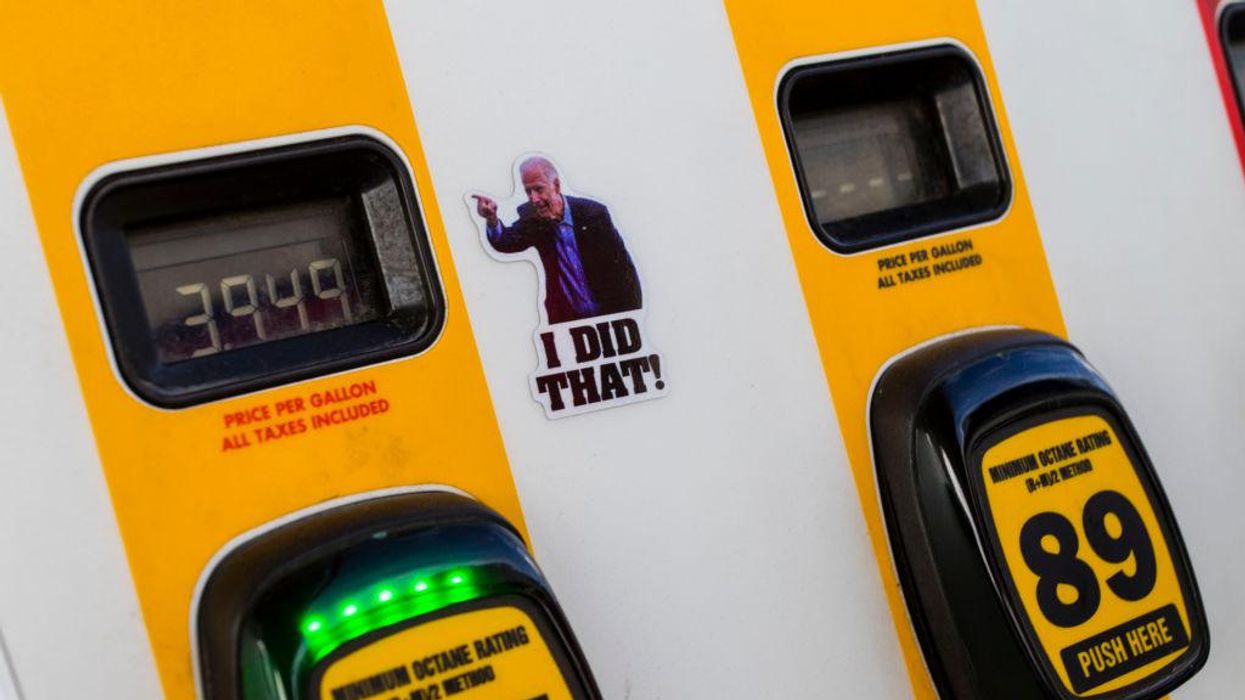
Ty O'Neil/SOPA Images/LightRocket via Getty Images

The Biden economy keeps smashing records — for inflation.
According to the latest report from the Bureau of Labor Statistics, the Consumer Price Index for October recorded a 6.2% increase over the last year. It is the largest increase in prices for consumer goods recorded in more than 30 years.
Looking at just October, the CPI increased .9%, growing faster than in the months of July, August, or September.
The largest price increases month-to-month were for energy, up 4.8%, food up .9%, medical care services and shelter, each up .5%.
The price of gasoline rose 6.1% in October, its fifth consecutive monthly increase. Compared to last year, gas is a whopping 49.6% more expensive. Electricity was 1.8% more expensive in October.
New vehicle prices rose 1.4%, and used cars and trucks saw a 2.5% price increase last month as well. But compared to last year, used cars and trucks are 26.4% more expensive.
There were a few price decreases. Airline fares fell 0.7% and the price for alcoholic beverages decreased 0.2%.
But the stark reality is that the prices keep going up for goods every American needs to buy every week to keep living, leaving everyone with less money in their pockets.
For example, the average price for a carton of orange juice in January 2020 was $3.29. After the pandemic, OJ costs consumers an average $3.53 per carton.
"A dozen eggs used to cost on average $2.20, but are now up to $2.52. Chicken breast has risen to $3.24 a pound from $2.99 a pound, fresh ground beef is up to $5.93 per pound, sandwich bread up from $2.44 a loaf to $2.77, and a pound of bacon up from $4.72 to a sizzling $6.45," NBC News reported.
Americans are noticing, and recent polls suggest they're blaming the guy in charge. President Joe Biden's job approval plummeted to a dismal 38% in a recent USA Today/Suffolk University poll. The economy ranked as one of the most important issues surveyed that registered voters said Biden needs to focus on.
"Inflation hurts Americans pocketbooks, and reversing this trend is a top priority for me," President Joe Biden said in a statement on the economic news.
"The largest share of the increase in prices in this report is due to rising energy costs—and in the few days since the data for this report were collected, the price of natural gas has fallen. I have directed my National Economic Council to pursue means to try to further reduce these costs, and have asked the Federal Trade Commission to strike back at any market manipulation or price gouging in this sector," the president said.
BIden said he will be traveling to Baltimore Wednesday to discuss how the recently passed bipartisan $1.2 trillion infrastructure law will address these economic issues. He also called on Congress to pass his "Build Back Better" plan, a multitrillion spending proposal that will expand social safety-net programs and enact Biden's climate agenda.
Economists attribute the rise in consumer prices to ongoing supply chain issues exacerbated by the COVID-19 pandemic, as well as loose monetary policy from the Federal Reserve and massive coronavirus spending bills passed by Congress.
But in a statement made last week, the Federal Reserve maintained that inflation is "transitory" and that rising prices are needed in the short term to meet the Fed's target average of 2 percent in the long term. Since inflation has been lower than average for several years, the Fed wants to let it run "moderately above 2 percent for some time so that inflation averages 2 percent over time."
Bad weather and backed-up shipping are also driving up food prices, according to a financial analyst who spoke to NBC News.
"Various agricultural commodities — wheat, sugar, beef, and corn — are up by double-digit percentages this year and due to inclement weather and import backlogs, coffee prices are up over 50 percent year-to-date," Greg McBride, chief financial analyst for Bankrate, said. "While energy prices are up due to a surge in demand, food inflation is a consequence of supply chain constraints and unfavorable weather impacting harvests."
Those hit hardest by rising prices? People living on fixed income or public assistance, McBride said.